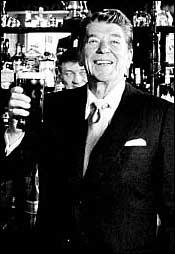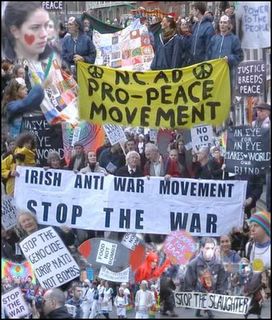Monday, March 28, 2005
Irelands View on America

On the eve of his sojourn in Europe last year, President Bush had an unpleasant run-in with a species of creature he had not previously encountered often: a journalist.
He did not react well to the experience.
Bush's minders usually leave him in the gentle care of the White House press corps, which can be counted on to ask him tough questions about when his summer vacation starts.

Apparently under the mistaken assumption that reporters in the rest of the world are as ill-informed and pliable as the stenographers who "cover" the White House, Bush's aides scheduled a sit-down interview with Carole Coleman, Washington correspondent for RTE, the Irish public television network

....Unfortunately, it appears that Coleman failed to receive the memo informing reporters that they are supposed to treat this president with kid gloves. Instead, she confronted him as any serious journalist would a world leader.... Did Coleman step out of line? Of course not. You will see in the video below that Coleman was neither impolite nor inappropriate. She was merely treating Bush as European and Canadian journalists do prominent political players. In Western democracies such as Ireland, reporters and politicians understand that it is the job of journalists to hold leaders accountable.

THE White House has lodged a complaint with the Irish Embassy in Washington over RTE journalist Carole Coleman's interview with US President George Bush.
And the President's staff withdrew from an exclusive interview which was to have been given to RTE the following morning by First Lady Laura Bush.
It is understood that both RTE and the Department of Foreign Affairs were aware of the exclusive arrangement. However, when RTE put Ms Coleman's name forward as interviewer, they were told Mrs Bush would no longer be available.
The Irish Independent learned that the White House told Ms Coleman that she interrupted the president unnecessarily and was disrespectful.She also received a call from the White House in which she was admonished for her tone. And it later emerged, that presidential staff suggested to Ms Coleman as she went into the interview that she ask him a question on the outfit that Taoiseach Bertie Ahern wore to the G8 summit.
And here is the video link to the TV interview, which you will not see on American television. Everyone should see this.
System Requirements:
Video: Real Player
 Click here to download Real Player
Click here to download Real Player
John F. Kennedy was greeted with almost religious fervor in 1963.
This is when JFK visited Cork City, Ireland in 1963. The picture was taken on Patrick Street. (Main street of Cork)
When Mr. Reagan came to Ireland, his ancestral village gave him an emotional homecoming and named a pub after him.

Mr. Clinton was celebrated in 1995 by a crowd of 100,000 that brought central Dublin to a standstill.
This picture was of President Clinton's first visit to Northern Ireland in November 1995 in belfast City for the turning on of the xmas lights. (15 months after the IRA announced its first cease-fire). He would visit Dublin and Belfast three time offically and many more unoffically- three visits more than any other serving US President has ever undertaken. Without him northern ireland would be a very different place today. While people may judge his presidency at home harshly, anyone in Ireland would leap to his defence as he genuinely liked and cared for this country. For his full involvement in Ireland please click here
Mr. Bush's reception was frosty, if not outright hostile, as widespread opposition to the Iraq war and revulsion at the Abu Ghraib prison scandal have turned a large portion of Irish popular opinion against a US president, possibly for the first time in the history of Ireland.

On Friday, June 25th 2004 approximately 20,000 people turned out in Dublin to let George W. Bush know that his policies are not popular in Ireland. Thousands also travelled from all over the country to Shannon Airport and the nearby Dromoland Castle. The Irish State deployed masses of police and military to hide Bush from the protestors while politicians did all they could to play down the extent of the protests.

How can there be so little enthusiasm for welcoming President Bush in as pro-American a country as exists on the face of the earth? Our intelligentsia is pro-American; American popular culture, far from being resisted as it is elsewhere in Europe, has been a precious modernizing influence on the grim patriarchy that dominated Ireland until recent times; our teachers and students work in the United States in the summer, our athletes train there, our doctors and scientists do postgraduate work there, we all have friends and relations there. No wonder Ireland shut down more completely than any other country in the world — schools, pubs, business, transport, everything — on its day of mourning for the Sept. 11 attacks. Style is not entirely irrelevant, and I agree that the Bush administration has sometimes used a harsher style than was needed.
There is another twist: we Irish, in our quarrel with Britain, have relied on American power, and that implicates us in how that power is exercised. The images from the Abu Ghraib prison were especially shocking here. We took the British Army to the European Court of Human Rights for using techniques of interrogation in Northern Ireland much less extreme than were used in Abu Ghraib — and, for all we know, in Guantánamo Bay, in Afghanistan and elsewhere in Iraq. The British techniques were ruled inhuman and degrading. But this is unhelpful; the acrimony was there well before the Abu Ghraib pictures appeared. The problem is that the world is different with the end of the Cold War. She seems to recognize interests, but only dimly.
Ronald Reagan came and protesters against American actions in Central America landed in jail, but on the entertainment side, he was the perfect partner in genial, Oirish leprechaunery. It was also believed that he had leaned on Margaret Thatcher to bring her to negotiations with us on the future of Northern Ireland. And that's what has mattered most in modern Ireland's relationship with America. Its friendliness to us has often been the power behind our dealings with Britain.
The Clinton administration and both the Clintons went further; they put a lot of time and effort into installing a political structure in Northern Ireland that will work, however long it may be delayed by local malice. When Bill Clinton visited the republic the place was brought to a standstill.
And Iraq is only the most lurid in a sequence of isolationist initiatives — the abrupt rejection of the Kyoto Protocol, the imposition of protective tariffs, the hostility to any international court of justice, and above all, the disrespect this administration has shown to the United Nations. Not that anyone has unqualified respect for the United Nations. But small nations, in particular, have to rely on international bodies, and the United Nations for all its flaws is the international body we've got.





